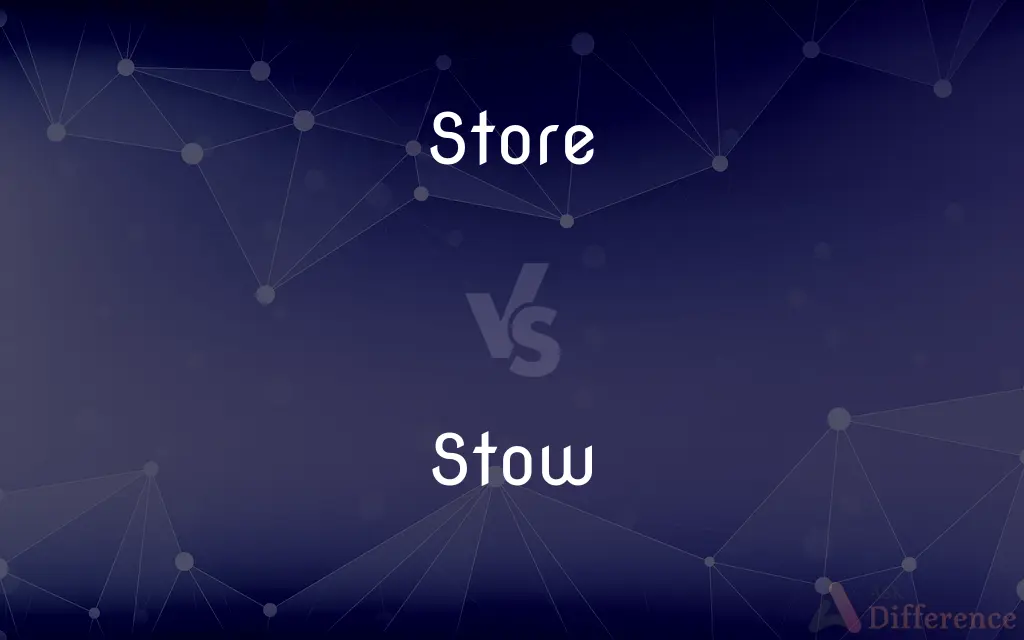Store vs. Stow — What's the Difference?
By Tayyaba Rehman & Fiza Rafique — Updated on April 20, 2024
"Store" involves placing items in a designated space for frequent access, while "stow" implies putting away items securely, often for space efficiency or safety.

Difference Between Store and Stow
Table of Contents
ADVERTISEMENT
Key Differences
"Store" typically refers to keeping goods or items in an organized manner where they can be easily accessed as needed, such as in a pantry or a retail environment. On the other hand, "stow" suggests a more strategic, often temporary placement of items to maximize space or secure them, commonly used in contexts like packing luggage or securing cargo.
In everyday usage, "store" can imply both the action of keeping items and the location where items are sold or kept, enhancing its versatility in conversational and commercial contexts. Whereas "stow" is usually reserved for specific contexts where items are not intended to be used immediately but kept safe and out of the way, such as stowing a suitcase overhead on an airplane.
The verb "store" is often used in contexts that involve preservation and accessibility, like storing data on a computer or storing food in a refrigerator. Conversely, "stow" carries a nuance of tidiness and compact storage, useful in minimizing the footprint of the stored items, such as stowing gear in a compact car trunk.
Regarding etymology, "store" comes from the Latin word "instaurare," which means to renew or establish, reflecting its broader applicative range in keeping items for use. In contrast, "stow" originates from the Old English "stōwigan," meaning to keep or place, which aligns with its specific usage in securing items.
In professional and technical environments, the distinction becomes more pronounced: "store" is regularly used in business and computing to denote keeping or managing inventory or data, whereas "stow" is frequent in nautical, aviation, and transportation sectors, emphasizing the secure and efficient arrangement of equipment or luggage.
ADVERTISEMENT
Comparison Chart
Primary Usage
To keep items for easy access and visibility
To pack or place items securely
Contexts
Retail, data storage, general home use
Nautical, aviation, packing, limited spaces
Connotation
Accessibility, preservation
Compactness, security
Typical Application
Food, clothes, data
Luggage, cargo, equipment
Etymological Origin
Latin "instaurare"
Old English "stōwigan"
Compare with Definitions
Store
To keep or put aside for future use.
She likes to store her winter clothes in vacuum-sealed bags.
Stow
To hide or conceal.
Stow away the gifts where the kids can’t find them.
Store
To save information digitally.
The company stores its data in a secure cloud server.
Stow
To arrange belongings in a compact manner.
She managed to stow all her books in the small cabinet.
Store
To preserve substances in a particular state.
Certain chemicals need to be stored at low temperatures.
Stow
To place something in a designated space.
He stowed the tools in the shed after finishing the job.
Store
To accumulate or stock up.
We store extra supplies in the basement for emergencies.
Stow
To pack or store items carefully and tidily.
Stow your bag under the seat in front of you.
Store
A retail establishment selling items.
He went to the store to buy some groceries.
Stow
To secure cargo in a vehicle or vessel.
The crew stowed the cargo tightly to prevent movement during the voyage.
Store
A place where merchandise is offered for sale; a shop.
Stow
To place or arrange, especially in a neat, compact way
Stowed his gear in the footlocker.
Store
A stock or supply reserved for future use
A squirrel's store of acorns.
Stow
To fill (a place or container) by packing tightly.
Store
Stores Supplies, especially of food, clothing, or arms.
Stow
To store for future use
Stowed carrots and potatoes in the root cellar.
Store
A place where commodities are kept; a warehouse or storehouse.
Stow
(Slang) To refrain from; stop.
Store
A great quantity or number; an abundance.
Stow
To provide lodging for; quarter.
Store
To reserve or put away for future use.
Stow
(rare) A place, stead.
Store
To fill, supply, or stock.
Stow
To put something away in a compact and tidy manner, in its proper place, or in a suitable place.
Store
To deposit or receive in a storehouse or warehouse for safekeeping.
Stow
To store or pack something in a space-saving manner and over a long time.
Store
(Computers) To copy (data) into memory or onto a storage device, such as a hard disk.
Stow
To arrange, pack, or fill something tightly or closely.
Store
A place where items may be accumulated or routinely kept.
This building used to be a store for old tires.
Stow
To dispose of, lodge, or hide somebody somewhere.
Store
A supply held in storage.
Stow
To cease; to stop doing something.
Store
(mainly North American) A place where items may be purchased; a shop.
I need to get some milk from the grocery store.
Stow
(obsolete) A cry used by falconers to call their birds back down to hand.
Store
Memory.
The main store of 1000 36-bit words seemed large at the time.
Stow
To place or arrange in a compact mass; to put in its proper place, or in a suitable place; to pack; as, to stowbags, bales, or casks in a ship's hold; to stow hay in a mow; to stow sheaves.
Some stow their oars, or stop the leaky sides.
Store
A great quantity or number; abundance.
Stow
To put away in some place; to hide; to lodge.
Foul thief! where hast thou stowed my daughter?
Store
A head of store cattle (feeder cattle to be sold to others for finishing); a store cattle beast.
Stow
To arrange anything compactly in; to fill, by packing closely; as, to stow a box, car, or the hold of a ship.
Store
(transitive) To keep (something) while not in use, generally in a place meant for that purpose.
I'll store these books in the attic.
Stow
Fill by packing tightly;
Stow the cart
Store
Contain.
The cabinets store all the food the mice would like.
Store
Have the capacity and capability to contain.
They sell boxes that store 24 mason jars.
Store
To write (something) into memory or registers.
This operation stores the result on the stack.
Store
That which is accumulated, or massed together; a source from which supplies may be drawn; hence, an abundance; a great quantity, or a great number.
The ships are fraught with store of victuals.
With store of ladies, whose bright eyesRain influence, and give the prize.
Store
A place of deposit for goods, esp. for large quantities; a storehouse; a warehouse; a magazine.
Store
Any place where goods are sold, whether by wholesale or retail; a shop.
Store
Articles, especially of food, accumulated for some specific object; supplies, as of provisions, arms, ammunition, and the like; as, the stores of an army, of a ship, of a family.
His swine, his horse, his stoor, and his poultry.
In his needy shop a tortoise hung,An alligator stuffed, and other skinsOf ill-shaped fishes; and about his shelvesA beggarly account of empty boxes.
Sulphurous and nitrous foam, . . . Concocted and adjusted, they reducedTo blackest grain, and into store conveyed.
Store
Accumulated; hoarded.
Store
To collect as a reserved supply; to accumulate; to lay away.
Dora stored what little she could save.
Store
To furnish; to supply; to replenish; esp., to stock or furnish against a future time.
Her mind with thousand virtues stored.
Wise Plato said the world with men was stored.
Having stored a pond of four acres with carps, tench, and other fish.
Store
To deposit in a store, warehouse, or other building, for preservation; to warehouse; as, to store goods.
Store
A mercantile establishment for the retail sale of goods or services;
He bought it at a shop on Cape Cod
Store
A supply of something available for future use;
He brought back a large store of Cuban cigars
Store
An electronic memory device;
A memory and the CPU form the central part of a computer to which peripherals are attached
Store
A depository for goods;
Storehouses were built close to the docks
Store
Keep or lay aside for future use;
Store grain for the winter
The bear stores fat for the period of hibernation when he doesn't eat
Store
Find a place for and put away for storage;
Where should we stow the vegetables?
I couldn't store all the books in the attic so I sold some
Common Curiosities
What are some synonyms for "stow"?
Some synonyms for "stow" are pack, tuck, secure, and shove.
What are some synonyms for "store"?
Some synonyms for "store" include stockpile, save, keep, and accumulate.
How do you use "store" in a sentence regarding technology?
In technology, "store" can be used like this: "The application stores user preferences locally on the device."
How does "stow" relate to safety?
"Stow" often relates to safety in contexts like aviation or maritime activities, where secure packing is crucial to prevent accidents or damage.
What does "stowage" mean and how does it relate to "stow"?
"Stowage" refers to the space available for storing or the method of packing cargo. It relates directly to "stow" as it involves the action of placing or packing items securely.
Can "store" imply a long-term action?
Yes, "store" can imply both short-term and long-term actions depending on context, especially in cases like wine storage or data archiving.
What does "stow away" mean?
"Stow away" refers to hiding oneself on a ship, aircraft, or other vehicle to travel secretly and without permission.
Is "store" used in legal language?
Yes, "store" is used in legal contexts, particularly regarding the storage of documents and compliance with data preservation laws.
Can "stow" be used figuratively?
Yes, "stow" can be used figuratively to mean putting away or suppressing emotions or thoughts, as in "stow your fears."
Does "store" have any architectural implications?
Yes, in architecture, "store" can refer to the design and layout of spaces meant for storing goods, such as warehouses or retail spaces.
In what contexts might "stow" not be appropriate to use?
"Stow" may not be appropriate in everyday contexts where the placement of items does not require compact or secure arrangement, like simply placing books on a table.
When should you use "store" instead of "stow" in professional communication?
Use "store" when referring to keeping information or items accessible and orderly, and "stow" for contexts requiring secure, compact packing.
Is it more common to use "store" or "stow" in everyday English?
"Store" is more commonly used in everyday English due to its broader applications in various contexts, from retail to personal item organization.
What are the etymological roots of "stow"?
"Stow" originates from the Old English "stōwigan," which means to keep or place, often in a secure or designated space.
How does the use of "store" in digital contexts differ from physical contexts?
In digital contexts, "store" refers to saving information in electronic form, while in physical contexts, it refers to placing tangible items in a space.
Share Your Discovery

Previous Comparison
Tyranny vs. Dictatorship
Next Comparison
Anywhere vs. AnyplaceAuthor Spotlight
Written by
Tayyaba RehmanTayyaba Rehman is a distinguished writer, currently serving as a primary contributor to askdifference.com. As a researcher in semantics and etymology, Tayyaba's passion for the complexity of languages and their distinctions has found a perfect home on the platform. Tayyaba delves into the intricacies of language, distinguishing between commonly confused words and phrases, thereby providing clarity for readers worldwide.
Co-written by
Fiza RafiqueFiza Rafique is a skilled content writer at AskDifference.com, where she meticulously refines and enhances written pieces. Drawing from her vast editorial expertise, Fiza ensures clarity, accuracy, and precision in every article. Passionate about language, she continually seeks to elevate the quality of content for readers worldwide.
















































